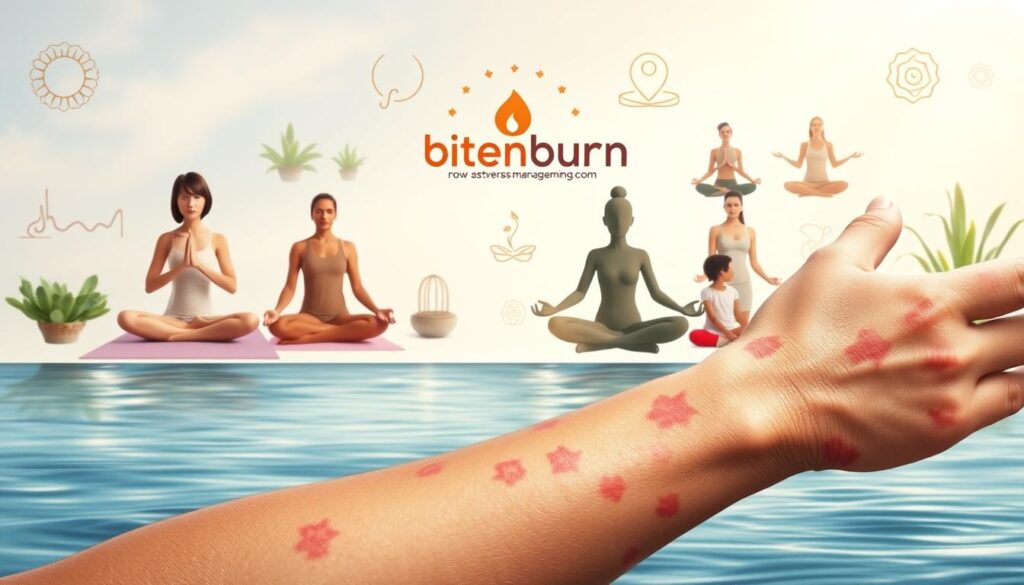Did you know over 40% of people with psoriasis say stress makes their symptoms worse? If you’re having trouble controlling your psoriasis, managing stress might be the answer. This article shows how psoriasis and stress management techniques can change your life.
Psoriasis is a chronic condition that causes red, scaly skin patches. But, what if managing stress could help? Stress management techniques are more than just relaxation. They’re backed by science to calm your skin and mind. Let’s dive into how.
Learn practical ways to stop stress and psoriasis symptoms from getting worse. This guide offers real solutions to reduce flare-ups, based on patient stories and research. Are you ready to see how stress management can help you?
Key Takeaways
- Stress is a top trigger for psoriasis symptoms, affecting 40% of patients.
- Actionable stress management techniques can reduce flare frequency and severity.
- Guided practices like meditation and exercise are proven tools in this guide.
- Real patient experiences show how these methods work in daily life.
- Combining science and personalized plans leads to long-term symptom control.
Explore the table of contents below to navigate this comprehensive guide:
- Understanding the Psoriasis-Stress Connection
- The Science Behind Stress Management
- Identifying Your Stress Triggers
- Mindfulness Meditation for Relief
- Exercise and Nutrition’s Role
- Building a Daily Routine
- Professional Support Options
- Overcoming Challenges
- Conclusion: Transform Your Health
Every section explores how stress management techniques relate to psoriasis care. Let’s begin by discovering the link between your mental state and skin health.
Understanding the Psoriasis-Stress Connection
Stress doesn’t just mess with your mood. It can also hurt your skin. Psoriasis happens when your immune system gets too active, and stress is a big trigger. High levels of stress hormones like cortisol can weaken your body’s defenses, making outbreaks more common.
Learning how stress affects your body is the first step to breaking the cycle.
How Stress Triggers Psoriasis Flare-ups
Stress hormones like cortisol mess with your immune system’s balance. This can cause your skin cells to grow too fast, leading to red, scaly patches. Things like job stress or money worries often start flare-ups.
It’s key to find ways to reduce stress to stop these outbreaks.
- Job pressures
- Family tensions
- Major life changes
The Vicious Cycle: When Psoriasis Causes More Stress
“My flare-ups made me avoid gatherings. The more I hid my skin, the more anxious I felt. It felt endless,” explained a patient in a 2023 study.
Seeing your symptoms can make you feel anxious or depressed. This can lead to more inflammation. It’s crucial to find ways to manage stress to break this cycle.
Real Patient Stories
Alice, 34, linked her worsening psoriasis to her divorce. As her skin reacted, her confidence dropped. She now uses daily walks and therapy to reduce stress and control outbreaks.
Mark, 45, found that work deadlines triggered breakouts. Learning breathing exercises helped him cut flare-ups by 40% in six months.
These stories show how stress relief can help fight psoriasis. Understanding the connection is the first step to taking control.
The Science Behind Psoriasis and Stress Management Techniques

Stress doesn’t just make us feel tense—it changes our body in real ways. When we’re stressed, our autonomic nervous system goes into “fight-or-flight” mode. This floods our body with stress hormones like cortisol.
This response is meant to protect us in emergencies. But when stress is constant, it can stay “on” too long. This leads to more inflammation, which makes psoriasis worse. It’s like our immune system is a fire hose, and stress turns up the pressure, causing skin cells to multiply too fast.
Recent studies show that chronic stress weakens our skin’s natural repair process. A 2022 review in the Journal of Investigative Dermatology found that high stress levels slow down skin cell turnover. This makes our skin more vulnerable to psoriasis flares.
But here’s the good news: stress management strategies can help. Techniques like deep breathing or yoga calm our nervous system. This lowers inflammation markers like CRP (C-reactive protein). These practices activate our body’s “rest and repair” mode.
- Deep breathing exercises slow heart rate and reduce skin inflammation.
- Mindfulness meditation boosts skin barrier function by lowering cortisol.
- Regular exercise improves immune balance, aiding psoriasis treatment outcomes.
Psoriasis treatment now often includes mind-body approaches. Psychodermatology, a growing field, studies how mental health interventions impact skin health. By using proven stress management strategies, patients gain a biological advantage. These tools aren’t just calming—they’re a scientific way to reset the body’s stress-inflammatory cycle.
Understanding this science turns stress management into a vital part of care. Upcoming sections will show exactly how to use these techniques daily, backed by this biological foundation. Your body’s systems are listening—now it’s time to give them the right signals.
Identifying Your Stress Triggers
Knowing what causes your psoriasis symptoms starts with knowing yourself. By tracking daily stressors and their effects, you can find patterns. This helps in using psoriasis and stress management techniques more effectively. Start with small steps to find out what triggers your symptoms.
Keeping a Stress-Symptom Journal
Begin a stress management tips diary to link daily stress with psoriasis symptoms. Record these every day:
- Stress level (1-10 scale)
- Major stressors (meetings, deadlines, etc.)
- Changes in redness, itching, or patch size
- Sleep quality (hours slept, restfulness)
Keep this up for 2-4 weeks to see patterns. For instance, if flare-ups happen when you don’t sleep well, make sure to get enough rest.
Common Stress Triggers for Psoriasis Patients
| Trigger | Why It Matters |
|---|---|
| Work pressure | Deadlines raise cortisol, worsening skin inflammation. |
| Relationship conflicts | Emotional tension can delay healing processes. |
| Financial stress | Money worries increase anxiety, triggering flare-ups. |
| Seasonal changes | Cold weather or humidity shifts may strain skin and mood. |
| Perfectionism | High expectations create chronic stress cycles. |
| Poor sleep | Lack of rest weakens immune response to psoriasis symptoms. |
| Certain medications | Some drugs increase stress hormone levels indirectly. |
Your triggers are unique. Use this guide as a starting point. Small changes in your routine today can lead to big improvements later. Stay curious about what your body tells you.
Mindfulness Meditation for Psoriasis Relief

Mindfulness meditation is a great way to reduce stress for those with psoriasis. Studies show it can lower inflammation and help with flare-ups caused by stress. Even short sessions can change how your brain handles stress, making it a good psoriasis remedy.
- Guided Body Scan Meditation: Lie down and pay attention to how each part of your body feels. If you notice psoriasis, just observe it without judgment. Use phrases like “Breathe into the affected skin” to help you stay focused.
- Loving-Kindness Meditation: Say things like “May my skin heal” to yourself. This helps replace negative thoughts with kindness. It can help lessen the emotional stress that makes symptoms worse.
For muscle tension, try progressive muscle relaxation. Tighten then relax muscles near psoriasis patches. This can help reduce stress in those areas and prevent flare-ups.
Apps like Headspace and Calm have special programs for you. Check out free resources like the American Mindfulness Research Association for science-backed tips. Just 5 minutes a day can help you build up against stress.
Physical Exercise as a Powerful Stress Management Tool
Regular physical activity is crucial for managing psoriasis and stress techniques. It lowers cortisol, the stress hormone, and releases endorphins that improve mood. Even simple activities like walking or stretching can help with both mental and skin issues.
- Cardiovascular exercise: Walking, cycling, or dancing reduce inflammation and improve circulation.
- Yoga: Combines flexibility with mindful breathing, a proven stress management strategy.
- Swimming: Water supports joints and avoids skin friction.
- Strength training: Low-impact workouts build resilience without overexertion.
Worried about sensitive skin? Adapt workouts to your needs. Wear loose layers to protect plaques, shower promptly after sweating, or opt for home routines like chair yoga. Even 10 minutes daily helps—consistency matters more than intensity.
Sample 7-day plan:
- Day 1: 15-minute garden stroll
- Day 2: 10-minute chair stretches
- Day 3: 20-minute pool swim
- Day 4: 5-minute deep breathing + walking
- Repeat or mix activities based on energy levels.
Always consult a doctor before starting new exercises, specially with psoriatic arthritis. Every step toward movement is a step toward calmer skin and mind.
Nutrition and Diet Changes That Support Stress Reduction

Your diet can help calm stress and ease psoriasis symptoms. Certain foods fight inflammation and lower stress hormones. They are key in psoriasis and stress management techniques. These choices support overall health and can enhance your psoriasis treatment.
Anti-inflammatory Foods for Psoriasis Patients
Eat these foods to reduce inflammation and stress:
- Omega-3s: Salmon, walnuts, and flaxseeds. These contain EPA/DHA and ALA, which lower inflammation and improve mood.
- Antioxidants: Berries, spinach, and bell peppers. Vitamins C and E protect cells and reduce stress-induced damage.
- Probiotics: Yogurt, kefir, and sauerkraut. Gut health affects skin and stress response, so probiotics support both.
- Spices: Turmeric (curcumin) and ginger. These block inflammatory pathways linked to psoriasis flare-ups.
Try recipes like:
- Salmon with roasted veggies and walnuts
- Smoothies with spinach, berries, and turmeric
- Quinoa salad with ginger dressing and fermented veggies
Foods and Beverages to Avoid
Cut back on these triggers:
- Alcohol: Exacerbates inflammation and skin health.
- Caffeine: Overconsumption raises cortisol levels.
- Sugary snacks: Spikes insulin and worsens flare-ups.
- Potential allergens like dairy or gluten (if sensitive).
Swap sugary snacks for nuts or fruit. Track triggers in a food journal to tailor your approach. Small changes can make a big difference in managing psoriasis symptoms through diet.
These dietary changes are part of holistic psoriasis remedies. Always consult a healthcare provider to balance diet with medical care.
Creating a Daily Stress Management Routine
Creating a daily routine with psoriasis and stress management techniques is all about being consistent, not perfect. Small habits like deep breathing or a quick skincare routine can help. Start with something simple and let these habits grow over time.
Morning Rituals for Reduced Stress
Start your day with these stress management tips:
- 5-minute deep breathing: Inhale for 4 counts, hold, exhale for 6 counts.
- Meditate for 10 minutes using apps like Headspace or Calm.
- Stretch gently—try yoga poses like cat-cow to boost circulation.
- Incorporate a mindful skincare routine using fragrance-free moisturizers.
“My 15-minute morning routine cuts my stress in half. Even on busy days, 5 minutes of breathing helps.” — Sarah, psoriasis patient
Evening Wind-down Practices
Get ready for bed with these stress reduction steps:
- Set a 7 PM electronics curfew to reduce blue light exposure.
- Soak in warm water with colloidal oatmeal or Dead Sea salts.
- Journal 3 stressors and 3 positive moments from the day.
- Try 4-7-8 breathing: Inhale 4 sec, hold 7 sec, exhale 8 sec.
“A warm Epsom salt bath before bed has improved my skin and sleep.” — Michael, 45
Download our free weekly planner template to schedule these activities. Remember, stress management techniques work best when tailored to your life. Celebrate small wins—your skin and mind will thank you over time.
Professional Treatment Options

When self-help steps aren’t enough, professional help is key. It bridges the gap between stress and psoriasis. By combining psoriasis treatment with stress management strategies, a stronger recovery plan is formed. Here’s how to explore these options:
Therapy Approaches for Stress-Related Psoriasis
Specialized therapies target both stress and skin health. Key options include:
- Cognitive Behavioral Therapy (CBT): Replaces anxiety patterns with coping skills. Weekly sessions focus on thought restructuring over 12–16 weeks.
- Mindfulness-Based Stress Reduction (MBSR): An 8-week program blending meditation and body awareness. Offered at clinics specializing in chronic conditions.
- Biofeedback: Teaches control of stress responses like heart rate. Sensors show real-time data to practice relaxation techniques.
- Acceptance and Commitment Therapy (ACT): Helps embrace emotions without judgment, easing anxiety around visible psoriasis. Sessions build self-compassion practices.
Find certified therapists via the American Psychological Association or the National Psoriasis Foundation.
When to Consider Medication
Medication may join stress care for severe cases. Psoriasis treatment options include:
- Topical creams (e.g., corticosteroids)
- Biologic injections targeting immune responses
- Phototherapy light treatments
Anti-anxiety or antidepressant prescriptions could also be part of a plan. Always involve both dermatologists and mental health experts to align goals. Ask providers:
- “How do stress levels affect my skin’s response to treatment?”
- “Can you recommend a therapist experienced in chronic conditions?”
Professional teams design plans where stress management techniques and medication work hand-in hand. Always voice concerns about the stress-skin connection to ensure all factors are addressed.
Building a Support Network
Feeling alone can make psoriasis symptoms worse and trap you in a cycle of stress. Building a support network breaks this cycle by providing tools for stress relief and shared coping strategies. Here’s how to start:
Join psoriasis and stress management techniques groups like those offered by the National Psoriasis Foundation (NPF). org). These groups connect you with others who understand flare-ups and daily challenges. Search their website to find local meetings or virtual events.
- Online forums: Try r/Psoriasis on Reddit or the American Academy of Dermatology’s patient community for advice and shared experiences.
- Family conversations: Share scripts like, “My psoriasis flares when I’m stressed. Can we take walks together to reduce stress?”
- Set boundaries: Politely say, “I need quiet time tonight to practice deep breathing,” to protect your mental health.
Involve loved ones in activities like yoga classes or guided meditations. Even small steps, like sharing a calming playlist, strengthen bonds and lower stress.
“Knowing I’m not alone helps me face each day.” – Sarah, psoriasis patient
Professional counselors can help if social anxiety or isolation feels overwhelming. Therapists specializing in chronic illness can teach communication skills to deepen your support system.
Whether through online chats or in-person hugs, connecting with others turns stress into strength. You don’t have to manage psoriasis alone.
Common Challenges and How to Overcome Them

Managingpsoriasis and stress management techniquesisn’t always easy. Flare-ups and social pressures can make it tough. Here’s how to adapt when challenges arise.
Staying Motivated During Flare-ups
When psoriasis symptoms flare, it’s hard to manage stress. Start small: try 2-minute breathing exercises instead of 10-minute meditation. A patient shared,
“I use audio meditations lying down when my skin hurts too much to sit. Even 5 minutes helps.”
Adjust workouts to gentle stretches or chair yoga. Remember, it’s about progress, not perfection.
Dealing with Stress in Public Settings
Social stressors like stares or comments can spike anxiety. Prep ahead: wear breathable fabrics and carry stress balls. Practicestress management tipslike box breathing (inhale 4-seconds, hold 4-seconds, exhale 4-seconds). Repeat). If criticized, say, “This is a chronic condition, but I’m managing it.”
- Time crunch? Set 2-minute daily check-ins instead of hour-long routines.
- Feeling stuck? Try new techniques weekly—journaling, art therapy, or walking meditations.
- Visible symptoms? Carry affirmations cards to remind yourself of past successes.
Persistence builds resilience. Small, consistent efforts over weeks—not days—create lasting change. Adapt, adjust, and keep moving forward.
Conclusion: Transforming Your Life Through Effective Stress Management
Reducing stress is key to managing psoriasis. Studies show that less stress means less inflammation and better skin. By tackling emotional triggers, you can stop flare-ups.
Start with small steps like a 10-minute meditation or a short walk. These actions help you move towards lasting change.
A 30-day plan could include daily deep breathing, weekly yoga, and journaling. Success isn’t just about clearer skin. It’s also better sleep, fewer worries, and feeling more in control.
Take Sarah’s example. She reduced flare-ups by 40% with evening walks and a mindfulness app. Her story proves the power of consistency.
Psoriasis and stress management work best with professional help and support. Use therapy, support groups, or apps like Headspace. Every effort counts.
Begin today with a small change, like a turmeric latte or gratitude before bed. Your skin, mind, and body will appreciate it. With patience and persistence, you can change your life, one mindful moment at a time.


[…] vitamin D is linked to worse psoriasis symptoms in most […]
[…] scaly plaques on the skin, the condition involves much more. The root cause lies in an overactive immune system, which triggers inflammation throughout the […]
[…] techniques offer a powerful tool for managing stress and improving productivity in the workplace. By incorporating these practices into your daily […]
[…] life. Between school demands and shifting social dynamics, this phase shapes how they handle stress, form connections, and make […]
[…] starts with an overactive immune system that inflames the skin. This inflammation can also harm blood vessels, increasing heart disease […]
[…] Home-based treatments can provide relief from symptoms. […]